WMG News
New report says UK electric vehicle battery industry could be worth £2.7 billion per year for UK chemical companies
 A new report published today Monday 25th June 2018 shows that UK companies are well-placed to supply valuable materials needed for batteries to be built in UK – a potential £2.7 billion per year business opportunity. The report commissioned by WMG at the University of Warwick, was launched to the Chemical Industry Association at the Chemistry Growth Partnership meeting in London, chaired by Steve Foots, Chief Executive of Croda, and attended by Richard Harrington MP.
A new report published today Monday 25th June 2018 shows that UK companies are well-placed to supply valuable materials needed for batteries to be built in UK – a potential £2.7 billion per year business opportunity. The report commissioned by WMG at the University of Warwick, was launched to the Chemical Industry Association at the Chemistry Growth Partnership meeting in London, chaired by Steve Foots, Chief Executive of Croda, and attended by Richard Harrington MP.
The research underpinning the report brought together experts and data from the automotive battery industry and chemicals industry, working in the context of the UK’s Industrial Strategy, points to a large UK battery manufacturing industry opportunity. The report was funded by EPSRC, commissioned and managed by WMG at the University of Warwick acting in their role as the Advanced Propulsion Centre Electrical Energy Storage Spoke, and delivered in partnership with E4tech. WMG’s Professor David Greenwood, one of the report’s authors said:
“This report details a massive opportunity to grow a UK battery chemicals industry and related supply chain. The UK’s Industrial Strategy identified battery development and manufacture as one of the four initial Grand Challenges to coalesce industrial activity upon high growth opportunities. Battery pack manufacturing for electric vehicles (EVs) will logically take place close to the point of vehicle assembly since packs are hard to transport. This in turn implies that the battery cells which make up the packs will best be manufactured in (or close to) the UK. This could also mitigate the loss of vehicle engine production.”
“However for cell production to occur in the UK, the supply chains of chemicals would need to be reconfigured, since most cell production and chemicals supply is currently in Asia. Whilst such components could be imported, to capture the most value cell production and the related chemical and process equipment supply would need to come from UK suppliers.”
RESOLVE prototypes shape future of electric urban commuting
 The future of daily urban commuting could be small, lightweight Electric L-category Vehicles (ELVs). A cost effective, energy efficient and comfortable alternative to traditional cars in cities, is at the heart of the €6.92m RESOLVE project, which included WMG at the University of Warwick.
The future of daily urban commuting could be small, lightweight Electric L-category Vehicles (ELVs). A cost effective, energy efficient and comfortable alternative to traditional cars in cities, is at the heart of the €6.92m RESOLVE project, which included WMG at the University of Warwick.
The European project – named ‘Range of Electric Solutions for L-category Vehicles’ – designed and developed two stylish tilting four-wheeler prototype ELVs with leading European manufacturers Piaggio and KTM. These demonstrators were unveiled, and presented to representatives from the European Commission, at an event in Brussels in April 2018.
WMG was one of fourteen partners in the project, which included leading names from industry and research such as Piaggio, KTM, Bosch, Ricardo, the Austrian Institute of Technology, and the University of Florence.
£5.6m Vehicle-2-Grid project develops charging technology in real world
Electric vehicle charging infrastructure on UK roads is to be advanced, thanks to a new £5.6 million project – funded by Innovate UK – to develop Vehicle-2-Grid (V2G) technologies, involving WMG at the University of Warwick.
For three years from April 2018, the EV-elocity consortium will conduct a project to demonstrate and develop V2G technology across a variety of UK locations, including airports and business parks – with the aim of proving its viability and worth to business and the wider public.
 Researchers at WMG, led by vehicle electrification and energy storage expert Dr James Marco, will build a techno-economic model of how V2G will be viable within the UK. A key innovation will be the inclusion of new models of battery degradation within the analysis that will underpin new methods to optimise the vehicle’s battery system.
Researchers at WMG, led by vehicle electrification and energy storage expert Dr James Marco, will build a techno-economic model of how V2G will be viable within the UK. A key innovation will be the inclusion of new models of battery degradation within the analysis that will underpin new methods to optimise the vehicle’s battery system.
Dr Marco’s team will also analyse real-world usage data from a range of different electric fleet vehicles as they are used within a V2G context.
The project will break new ground in helping consumers, businesses and infrastructure providers to financially benefit from adapting their charging behaviour and vehicle use.
In doing so, the project will help to further accelerate and incentivise the transition from traditional fuel sources to electric vehicles.
New sensor tech for commercial Lithium-ion batteries finds they can be charged 5 times faster
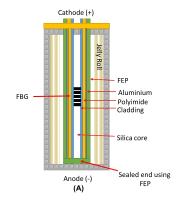 Researchers at WMG at the University of Warwick have developed a new direct, precise test of Lithium-ion batteries’ internal temperatures and their electrodes potentials and found that the batteries can be safely charged up to five times faster than the current recommended charging limits. The new technology works in-situ during a battery’s normal operation without impeding its performance and it has been tested on standard commercially available batteries. Such new technology will enable advances in battery materials science, flexible battery charging rates, thermal and electrical engineering of new battery materials/technology and it has the potential to help the design of energy storage systems for high performance applications such as motor racing and grid balancing.
Researchers at WMG at the University of Warwick have developed a new direct, precise test of Lithium-ion batteries’ internal temperatures and their electrodes potentials and found that the batteries can be safely charged up to five times faster than the current recommended charging limits. The new technology works in-situ during a battery’s normal operation without impeding its performance and it has been tested on standard commercially available batteries. Such new technology will enable advances in battery materials science, flexible battery charging rates, thermal and electrical engineering of new battery materials/technology and it has the potential to help the design of energy storage systems for high performance applications such as motor racing and grid balancing.
If a battery becomes over heated it risks severe damage particularly to its electrolyte and can even lead to dangerous situations where the electrolyte breaks down to form gases than are both flammable and cause significant pressure build up. Overcharging of the anode can lead to so much Lithium electroplating that it forms metallic dendrites and eventually pierce the separator causing an internal short circuit with the cathode and subsequent catastrophic failure.
Greg Clark announces £80 million funding for Coventry, Warwickshire and University of Warwick partnership to create new national battery facility
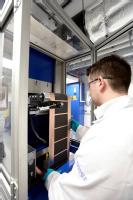 A partnership between WMG, at the University of Warwick, Coventry and Warwickshire Local Enterprise Partnership, and Coventry City Council has been awarded £80 million to establish a new National Battery Manufacturing Development Facility (NBMDF). The announcement was made by The Rt Hon Greg Clark, Secretary of State for Business, Energy and Industrial Strategy, while attending an energy conference on the University of Warwick campus on Wednesday 29th November 2017.
A partnership between WMG, at the University of Warwick, Coventry and Warwickshire Local Enterprise Partnership, and Coventry City Council has been awarded £80 million to establish a new National Battery Manufacturing Development Facility (NBMDF). The announcement was made by The Rt Hon Greg Clark, Secretary of State for Business, Energy and Industrial Strategy, while attending an energy conference on the University of Warwick campus on Wednesday 29th November 2017.
The new national facility will be established in the Coventry and Warwickshire area by WMG, the Coventry and Warwickshire LEP and Coventry City Council and it will enable UK based companies and researchers to come together to build and maintain a world leading position in manufacturing technologies for batteries and their components in vehicles and transportation. It will provide a crucial new strategic link between the research, development and full-scale industrialisation for battery technologies across the UK.
It will enable effective partnerships between manufacturers, researchers, and economic development leaders, while remaining independent from commercial interests and it will be governed with transparency.
WMG joins new £1.3 million vehicle battery recycling project
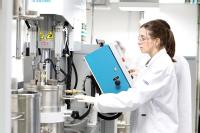 WMG, at the University of Warwick has joined a £1.3 million project with Connected Energy, Jaguar Land Rover and Videre Global to establish key components of a world leading second life battery value chain. The project is co-funded by an Innovate UK grant, awarded in October.
WMG, at the University of Warwick has joined a £1.3 million project with Connected Energy, Jaguar Land Rover and Videre Global to establish key components of a world leading second life battery value chain. The project is co-funded by an Innovate UK grant, awarded in October.
Connected Energy, a pioneer in site-integrated energy storage solutions, is based in Newcastle upon Tyne with a technical centre near Norwich. Its British designed E-STOR energy storage technology will be adapted to integrate recycled Jaguar Land Rover batteries, with other work to be undertaken by WMG on the use of varied second life battery modules. This innovative approach will further increase Connected Energy's knowledge base and performance of their E-STOR systems.
Reuse of electric vehicle batteries is compelling circular economy innovation. Second life enables greater exploitation of the carbon and energy embedded in the manufacturing of the batteries, adding to the sustainability credentials of electric vehicles as well as the electricity system. Using second life batteries also reduces system costs - making energy storage systems financially viable for a wider range of end users.
WMG at the University of Warwick is the academic research partner to the project. It is a department of the University of Warwick, and has a considerable reputation for energy storage research.
WMG software powers next generation intelligent JCBs
I ntelligent construction machines which are more fuel-efficient and environmentally friendly are set to enter the market, thanks to pioneering software developed by WMG, at the University of Warwick, and JCB.
ntelligent construction machines which are more fuel-efficient and environmentally friendly are set to enter the market, thanks to pioneering software developed by WMG, at the University of Warwick, and JCB.
The software was created as part of the Off-Highway Intelligent Power Management (OHIPM) project – a collaboration between JCB, WMG and Pektron, part-funded by Innovate UK - which sought to create the next generation of JCB vehicles.
Wanting to produce machines which emit fewer CO2 emissions, and to maintain their business performance in a changing market, JCB enlisted the world-class expertise of Dr James Marco from WMG’s energy team.
Dr Marco’s team analysed huge amounts of JCB data to establish which parts of the machine fleet could be most effectively optimised through intelligent power solutions, and how to benefit JCB’s diverse range of customers around the world.
The team at WMG then created the control software to operate intelligent engines with automotive powertrain technology, enabling them to sense when the machines are idle and make the decision to switch themselves off (or power down) when power is not required – leading to optimal energy efficiency and minimal pollution.
DELIVER-E: revolutionary electric delivery vehicle tech prototyped by WMG
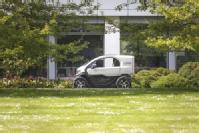 A technology demonstrator for a new type of electric delivery vehicle – which could make the courier industry greener and more efficient – has been developed by WMG at the University of Warwick and Warwickshire-based design company Astheimer Ltd.
A technology demonstrator for a new type of electric delivery vehicle – which could make the courier industry greener and more efficient – has been developed by WMG at the University of Warwick and Warwickshire-based design company Astheimer Ltd.
Based on the platform of a Renault Twizy, the DELIVER-E is a quiet, compact, lightweight electric vehicle, ideal for navigating urban environments, addressing issues like congestion, noise, pollution - and responding to the demands of an ever-growing shift to online shopping. This prototype allows cutting-edge WMG research outputs to be shown in a real, driveable vehicle.
A number of teams in WMG have worked on the project, including their SME Group who developed the original design, and with the help of one of their partners Astheimer, progressed the design from concept to prototype.
Astheimer developed the WMG concept to create a unique vehicle exterior - by enlarging its rear storage area, giving it space for three online delivery baskets. They also added new body panels to the DELIVER-E, and fitted it with programmable LED pixel strips, which can change colour for brake and indicator lights.
Response to the Faraday Challenge announcement
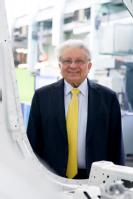 Professor Lord Bhattacharyya, Chairman, WMG, University of Warwick comments “I’m delighted to hear that the Government have announced plans to establish a centre for battery research in the UK. Not only will this support the Industrial Strategy, it will help change the perception of Britain from labs to manufacture.”
Professor Lord Bhattacharyya, Chairman, WMG, University of Warwick comments “I’m delighted to hear that the Government have announced plans to establish a centre for battery research in the UK. Not only will this support the Industrial Strategy, it will help change the perception of Britain from labs to manufacture.”
“Coventry and the sub region has a significant contribution to make in the delivery of the UK’s national industrial strategy, being in a strong position to lead the advancement of battery development, and vehicle electrification and autonomous vehicles. It will be at the heart of the drive to make the city a smart motor city.”
“Building on our automotive heritage, together with the Coventry and Warwickshire LEP, we are keen to develop and expand battery R&D, which will see the creation of these skilled jobs which will also be a trigger for other development by the private sector.
“Having a 37 year track record of working jointly with industry to innovate, and as leaders, for 15 years, in battery development, WMG are poised to continue to drive forward battery innovation and help create growth and employment in the UK.
The full announcement from the Business Secretary Greg Clarke MP can be heard here.
WMG partnership to improve automotive energy storage
 Assistant Professor John Low has been awarded an EPSRC First Grant to develop a more modern approach to design and manufacture automotive energy storage, targeting Lithium-ion battery and supercapacitor devices.
Assistant Professor John Low has been awarded an EPSRC First Grant to develop a more modern approach to design and manufacture automotive energy storage, targeting Lithium-ion battery and supercapacitor devices.
The project will focus on ‘a designer approach to structuring electrodes’ for improved energy storage performance so that low-carbon plug-in and electric vehicles can travel a longer distance per charge. The new electrodes are expected to gain a significant improvement in the final ‘usable’ energy density (Wh/kg) and ‘usable’ capacity (Ah) at device cell level.
The new and improved energy storage devices will be designed, manufactured and tested at our state-of-the-art battery prototyping WMG Energy Innovation Centre at the University of Warwick.
